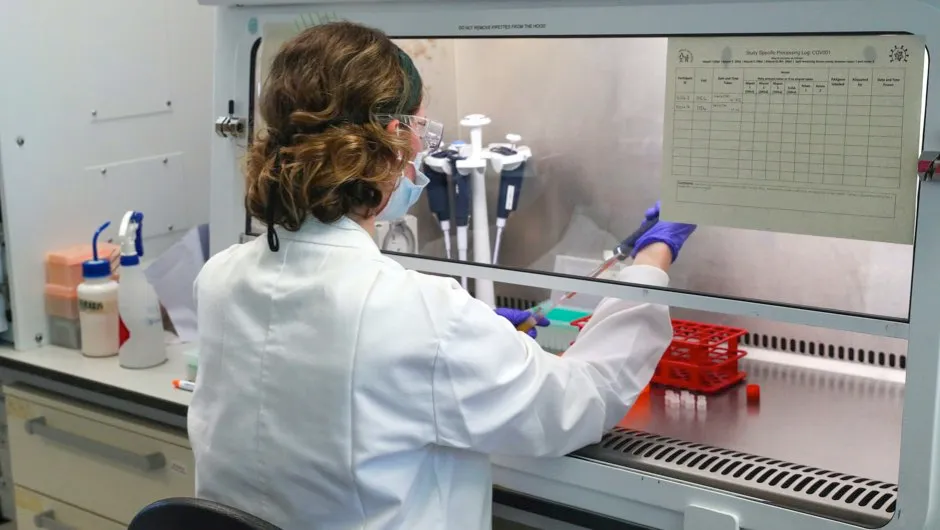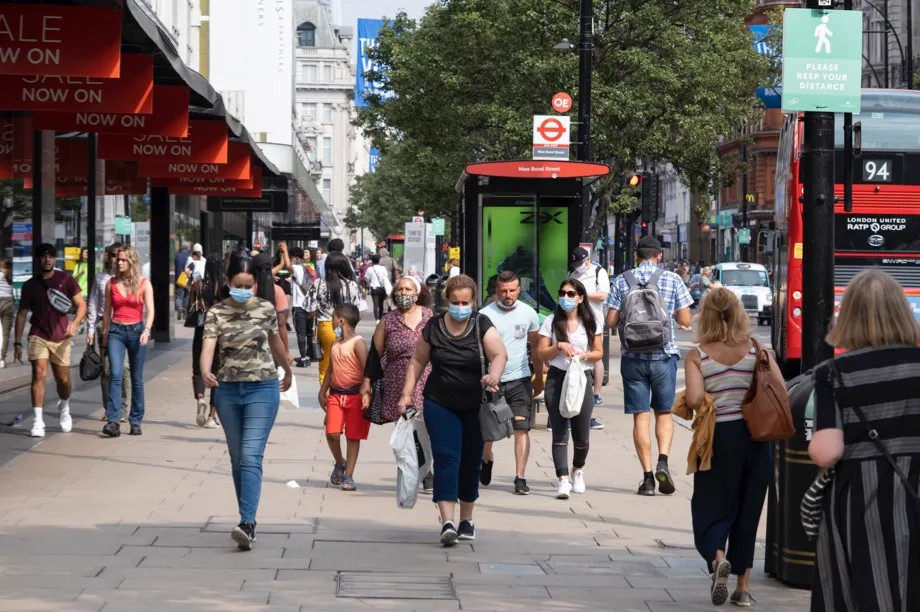New measures have been announced to strengthen the UK’s ability to deliver a coronavirus vaccine if one becomes available.
They include expanding the trained workforce who can administer COVID-19 and flu vaccines, and reinforced standards to support the Medicines and Healthcare products Regulatory Agency (MHRA) to grant temporary authorisation for the use of a new COVID-19 vaccine.
Read the latest vaccine news:
- Cambridge vaccine gets £1.9 million to begin clinical trials
- Oxford vaccine could be put before regulators by the end of the year
- Reality Check: Should we infect people with COVID-19 for vaccine research?
If a vaccine is discovered before 2021, the proposals will bolster existing powers that allow the MHRA to consider approving its use, before a full product licence is granted.
This is provided it is proven to be safe and effective during clinical trials.
The proposals consulted on today suggest ways to improve access and ensure as many people are protected from COVID-19 and flu as possible
Professor Jonathan Van-Tam, deputy chief medical officer
The measures are necessary because during the transition period, a potential COVID-19 vaccine must be granted a licence by the European Medicines Agency (EMA).
The regulations will permit the MHRA to consider giving temporary authorisation, allowing patients to benefit while it undergoes the full licensing process. This will be used as a last resort if there is a strong public health justification for widespread use of a vaccine before it has been granted a product licence.
From 2021, the MHRA will have a national licensing system in place and will be responsible for granting licences for potential vaccines and treatments once they meet standards of safety and effectiveness.

Deputy chief medical officer Professor Jonathan Van-Tam said: “We are making progress in developing COVID-19 vaccines which we hope will be important in saving lives, protecting healthcare workers and returning to normal in future.
“If we develop effective vaccines, it’s important we make them available to patients as quickly as possible but only once strict safety standards have been met.
“The proposals consulted on today suggest ways to improve access and ensure as many people are protected from COVID-19 and flu as possible without sacrificing the absolute need to ensure that any vaccine used is both safe and effective.”
Read more coronavirus news:
- Product found in an insect repellent may have anti-viral properties
- 33-year-old patient 'reinfected' months after first getting COVID-19
- Hundreds of animal species potentially at risk from COVID-19
On Friday, a three-week consultation was launched to look at amending the Human Medicine Regulations 2012, seeking opinions and advice from health experts and key stakeholders.
The measures could come into force by October, ahead of the winter season, the Department of Health and Social Care said.
Dr Christian Schneider, director of the National Institute for Biological Standards and Control (NIBSC) – part of the MHRA – said: “Whilst the existing licensing system, or a new UK one from next year, is the preferred and expected route to supply any vaccine, these new measures will strengthen the regulatory regime and our ability to protect public health.”

Under the proposals more fully trained healthcare professionals will be able to administer vaccines under NHS and local authority occupational health schemes, as well as enable an expanded workforce that can administer vaccinations. This will make it easier and quicker for patients to access the vaccines.
The expanded workforce could include a wider range of existing NHS staff, as well as groups such as student doctors and nurses.
The regulations already give healthcare workers and manufacturers protection from civil liability, but the consultation will look at clarifying the scope of the protection to ensure it applies to companies that order the medicines and the additional workforce that could be allowed to administer vaccinations.
How do scientists develop vaccines for new viruses?
Vaccines work by fooling our bodies into thinking that we’ve been infected by a virus. Our body mounts an immune response, and builds a memory of that virus which will enable us to fight it in the future.
Viruses and the immune system interact in complex ways, so there are many different approaches to developing an effective vaccine. The two most common types are inactivated vaccines (which use harmless viruses that have been ‘killed’, but which still activate the immune system), and attenuated vaccines (which use live viruses that have been modified so that they trigger an immune response without causing us harm).
A more recent development is recombinant vaccines, which involve genetically engineering a less harmful virus so that it includes a small part of the target virus. Our body launches an immune response to the carrier virus, but also to the target virus.
Over the past few years, this approach has been used to develop a vaccine (called rVSV-ZEBOV) against theEbola virus. It consists of a vesicular stomatitis animal virus (which causes flu-like symptoms in humans), engineered to have an outer protein of the Zaire strain of Ebola.
Vaccines go through a huge amount of testing to check that they are safe and effective, whether there are any side effects, and what dosage levels are suitable. It usually takes years before a vaccine is commercially available.
Sometimes this is too long, and the new Ebola vaccine is being administered under ‘compassionate use’ terms: it has yet to complete all its formal testing and paperwork, but has been shown to be safe and effective. Something similar may be possible if one of the many groups around the world working on a vaccine for the new strain ofcoronavirus(SARS-CoV-2) is successful.
Read more:
